Analyzing Evolving Management Accounting Changes and Key Skills
VerifiedAdded on 2023/06/10
|16
|3462
|94
Report
AI Summary
This report assesses the evolving changes in management accounting, focusing on the skills vital for management accountants and their transformation over the past decade. It examines analytical abilities, business acumen, management abilities, and the application of relevant knowledge in management accounting and operations. Key findings highlight significant changes from traditional accounting roles to the evolving concept of management accounting. The report also connects management accounting with motivators like competitive markets, organizational structure, and product technology, as well as catalysts such as poor financial performance and facilitators like autonomy and accounting resources. It emphasizes the impact of environmental and technological advancements, new management strategies, and a focus on customer service and competitive environments on the skills required for modern management accountants, including strategic thinking, analytical prowess, and business acumen.
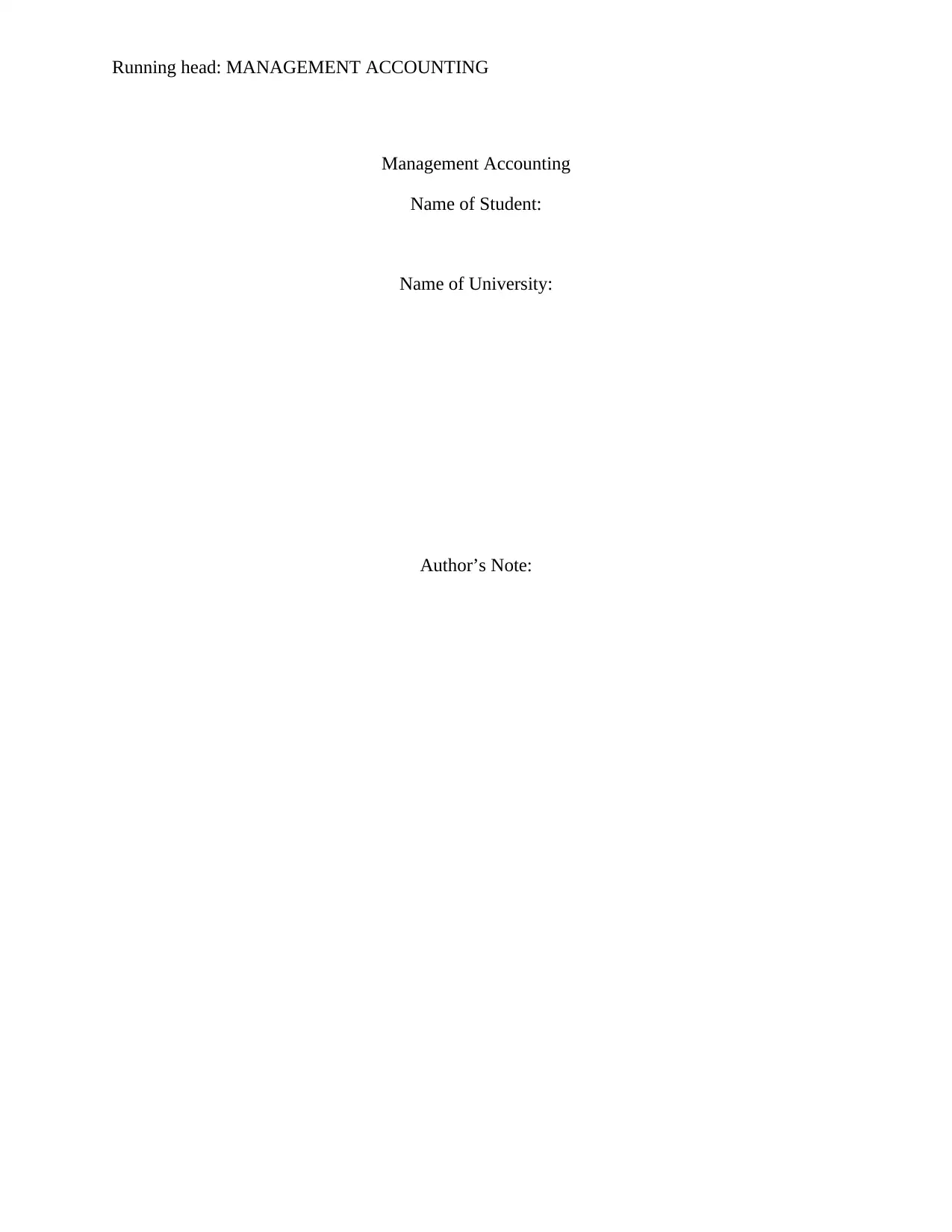
Running head: MANAGEMENT ACCOUNTING
Management Accounting
Name of Student:
Name of University:
Author’s Note:
Management Accounting
Name of Student:
Name of University:
Author’s Note:
Paraphrase This Document
Need a fresh take? Get an instant paraphrase of this document with our AI Paraphraser
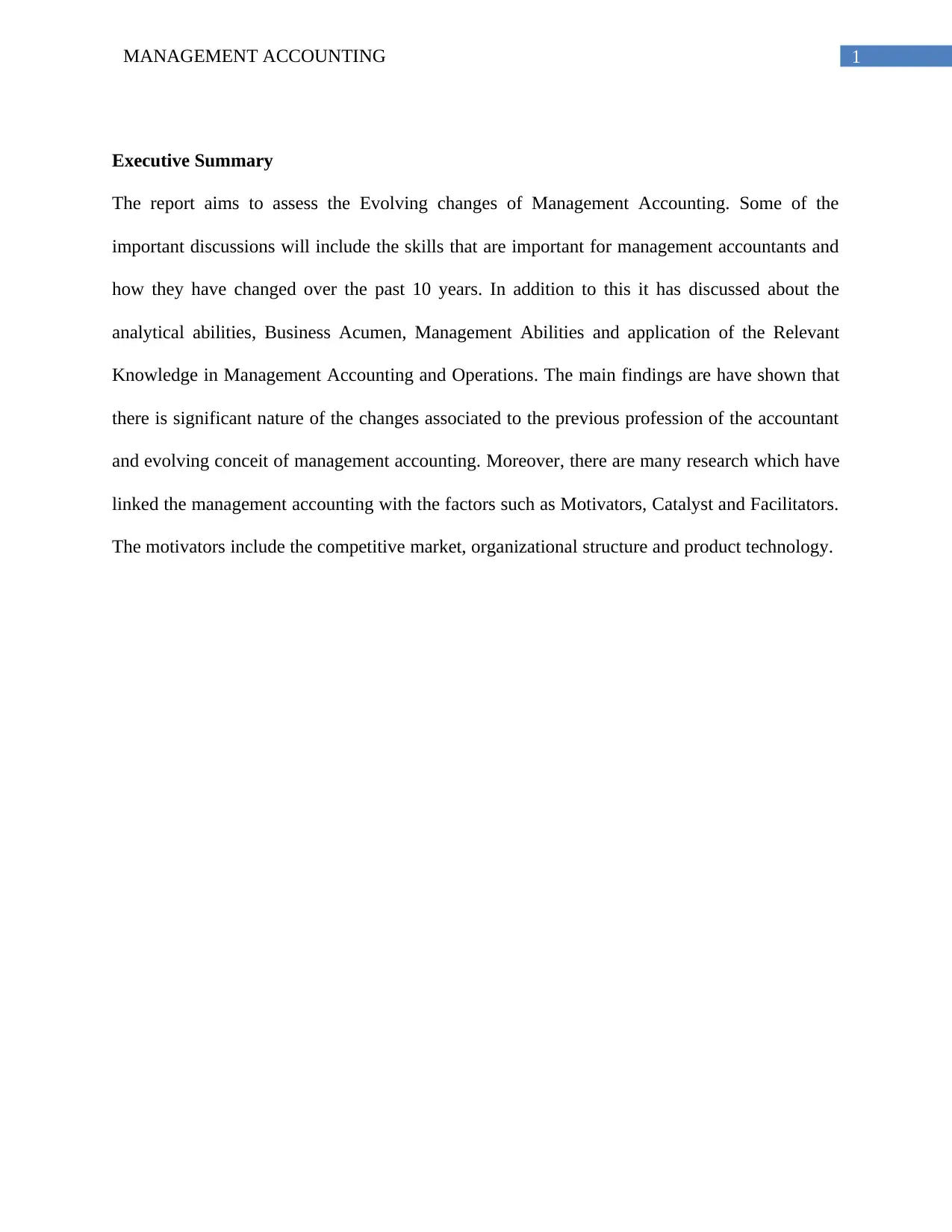
1MANAGEMENT ACCOUNTING
Executive Summary
The report aims to assess the Evolving changes of Management Accounting. Some of the
important discussions will include the skills that are important for management accountants and
how they have changed over the past 10 years. In addition to this it has discussed about the
analytical abilities, Business Acumen, Management Abilities and application of the Relevant
Knowledge in Management Accounting and Operations. The main findings are have shown that
there is significant nature of the changes associated to the previous profession of the accountant
and evolving conceit of management accounting. Moreover, there are many research which have
linked the management accounting with the factors such as Motivators, Catalyst and Facilitators.
The motivators include the competitive market, organizational structure and product technology.
Executive Summary
The report aims to assess the Evolving changes of Management Accounting. Some of the
important discussions will include the skills that are important for management accountants and
how they have changed over the past 10 years. In addition to this it has discussed about the
analytical abilities, Business Acumen, Management Abilities and application of the Relevant
Knowledge in Management Accounting and Operations. The main findings are have shown that
there is significant nature of the changes associated to the previous profession of the accountant
and evolving conceit of management accounting. Moreover, there are many research which have
linked the management accounting with the factors such as Motivators, Catalyst and Facilitators.
The motivators include the competitive market, organizational structure and product technology.
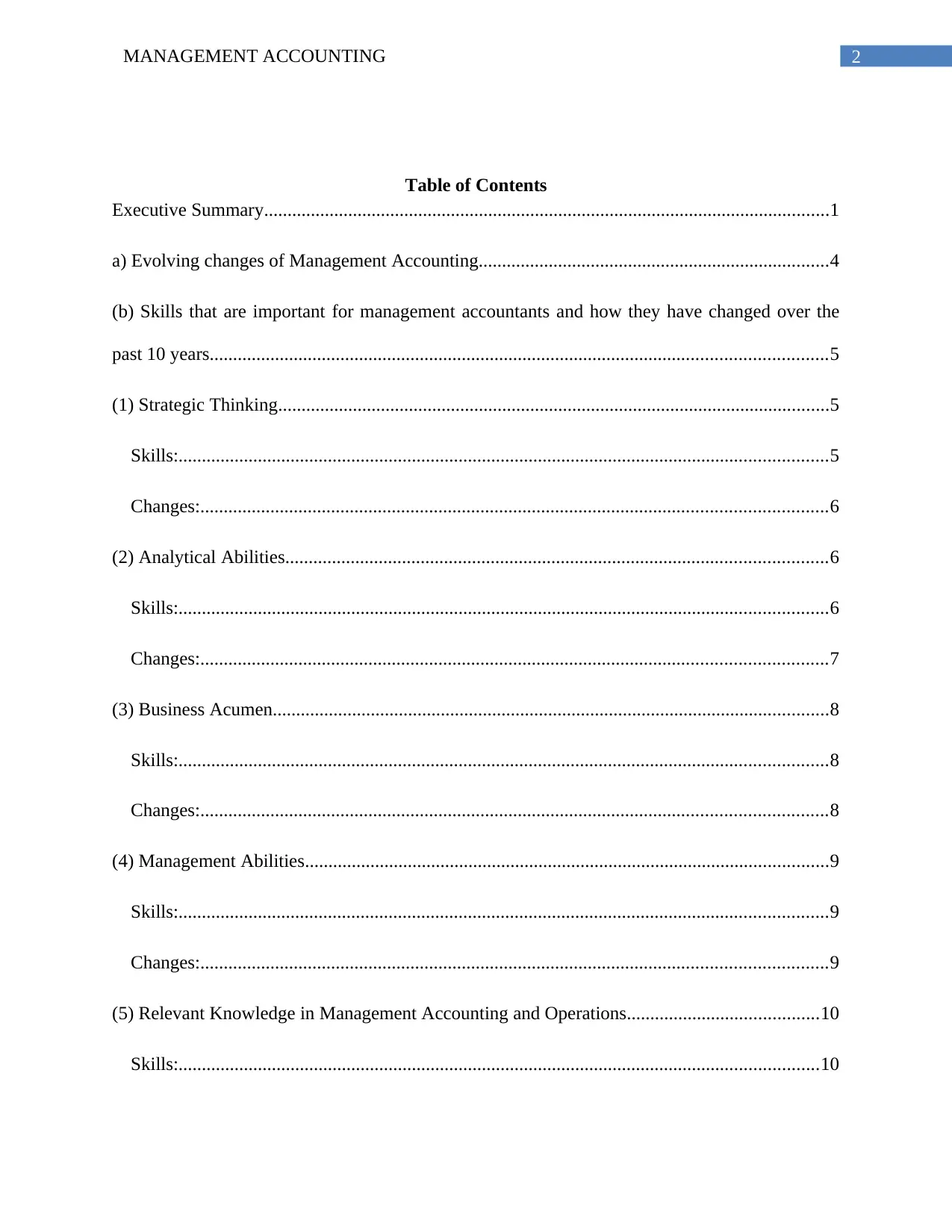
2MANAGEMENT ACCOUNTING
Table of Contents
Executive Summary.........................................................................................................................1
a) Evolving changes of Management Accounting...........................................................................4
(b) Skills that are important for management accountants and how they have changed over the
past 10 years....................................................................................................................................5
(1) Strategic Thinking......................................................................................................................5
Skills:...........................................................................................................................................5
Changes:......................................................................................................................................6
(2) Analytical Abilities....................................................................................................................6
Skills:...........................................................................................................................................6
Changes:......................................................................................................................................7
(3) Business Acumen.......................................................................................................................8
Skills:...........................................................................................................................................8
Changes:......................................................................................................................................8
(4) Management Abilities................................................................................................................9
Skills:...........................................................................................................................................9
Changes:......................................................................................................................................9
(5) Relevant Knowledge in Management Accounting and Operations.........................................10
Skills:.........................................................................................................................................10
Table of Contents
Executive Summary.........................................................................................................................1
a) Evolving changes of Management Accounting...........................................................................4
(b) Skills that are important for management accountants and how they have changed over the
past 10 years....................................................................................................................................5
(1) Strategic Thinking......................................................................................................................5
Skills:...........................................................................................................................................5
Changes:......................................................................................................................................6
(2) Analytical Abilities....................................................................................................................6
Skills:...........................................................................................................................................6
Changes:......................................................................................................................................7
(3) Business Acumen.......................................................................................................................8
Skills:...........................................................................................................................................8
Changes:......................................................................................................................................8
(4) Management Abilities................................................................................................................9
Skills:...........................................................................................................................................9
Changes:......................................................................................................................................9
(5) Relevant Knowledge in Management Accounting and Operations.........................................10
Skills:.........................................................................................................................................10
⊘ This is a preview!⊘
Do you want full access?
Subscribe today to unlock all pages.

Trusted by 1+ million students worldwide
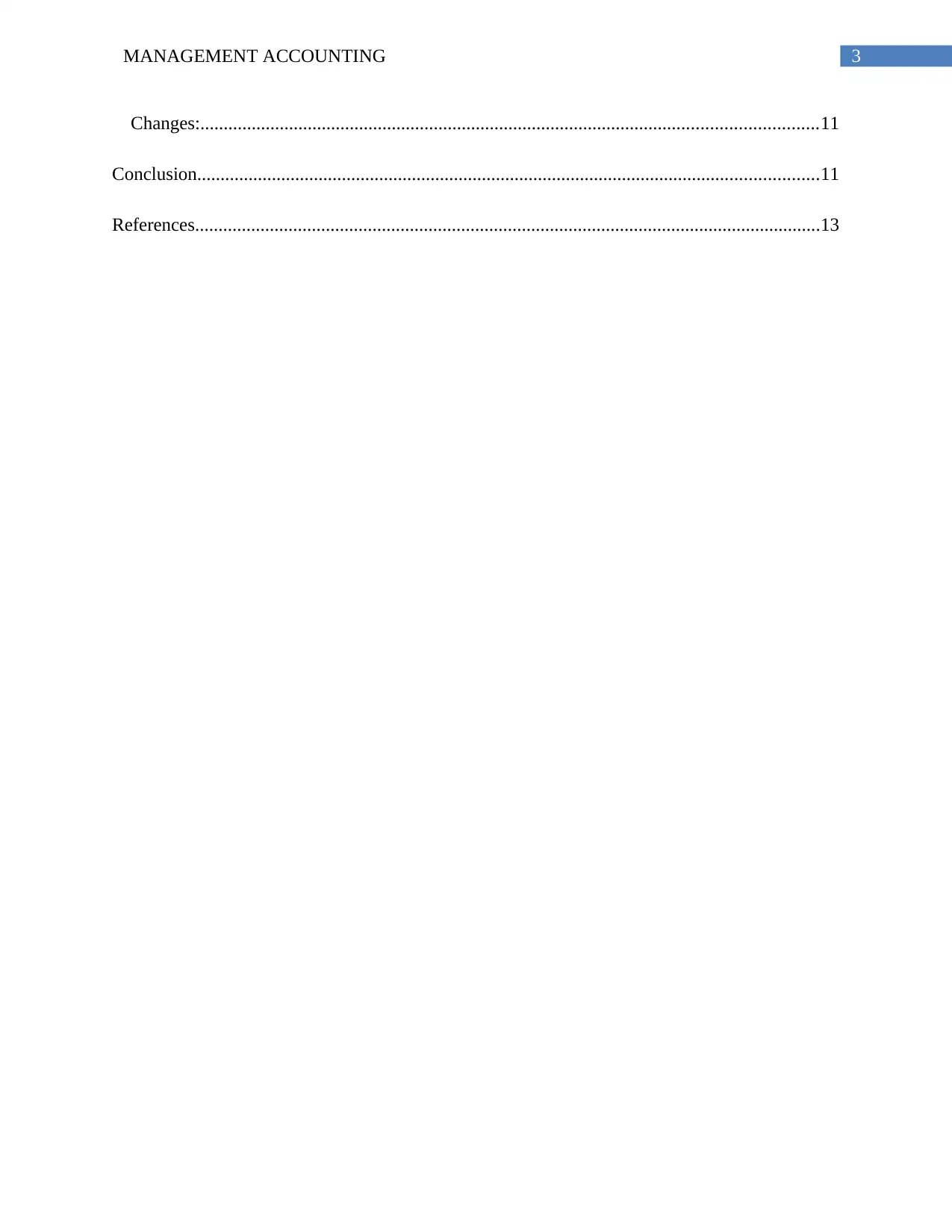
3MANAGEMENT ACCOUNTING
Changes:....................................................................................................................................11
Conclusion.....................................................................................................................................11
References......................................................................................................................................13
Changes:....................................................................................................................................11
Conclusion.....................................................................................................................................11
References......................................................................................................................................13
Paraphrase This Document
Need a fresh take? Get an instant paraphrase of this document with our AI Paraphraser
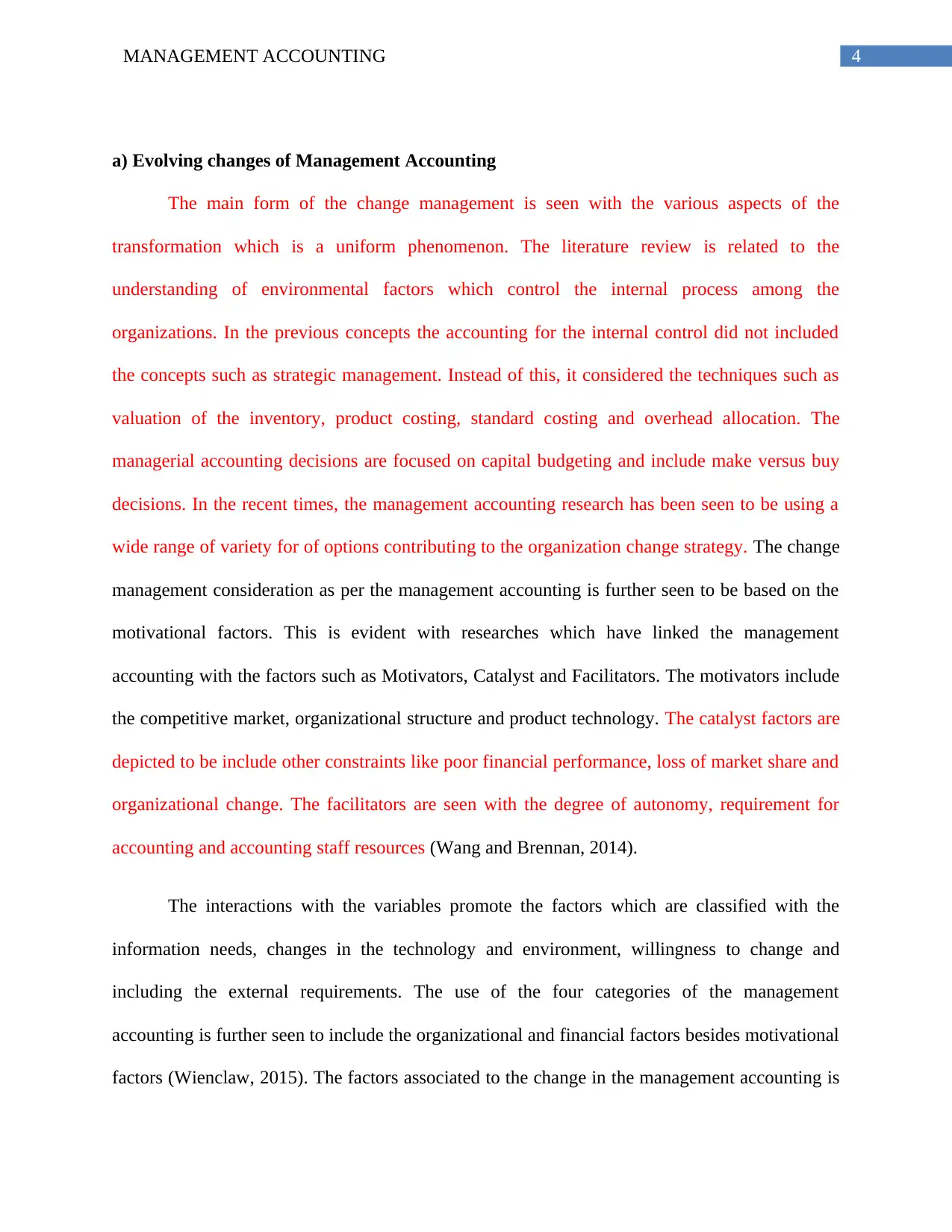
4MANAGEMENT ACCOUNTING
a) Evolving changes of Management Accounting
The main form of the change management is seen with the various aspects of the
transformation which is a uniform phenomenon. The literature review is related to the
understanding of environmental factors which control the internal process among the
organizations. In the previous concepts the accounting for the internal control did not included
the concepts such as strategic management. Instead of this, it considered the techniques such as
valuation of the inventory, product costing, standard costing and overhead allocation. The
managerial accounting decisions are focused on capital budgeting and include make versus buy
decisions. In the recent times, the management accounting research has been seen to be using a
wide range of variety for of options contributing to the organization change strategy. The change
management consideration as per the management accounting is further seen to be based on the
motivational factors. This is evident with researches which have linked the management
accounting with the factors such as Motivators, Catalyst and Facilitators. The motivators include
the competitive market, organizational structure and product technology. The catalyst factors are
depicted to be include other constraints like poor financial performance, loss of market share and
organizational change. The facilitators are seen with the degree of autonomy, requirement for
accounting and accounting staff resources (Wang and Brennan, 2014).
The interactions with the variables promote the factors which are classified with the
information needs, changes in the technology and environment, willingness to change and
including the external requirements. The use of the four categories of the management
accounting is further seen to include the organizational and financial factors besides motivational
factors (Wienclaw, 2015). The factors associated to the change in the management accounting is
a) Evolving changes of Management Accounting
The main form of the change management is seen with the various aspects of the
transformation which is a uniform phenomenon. The literature review is related to the
understanding of environmental factors which control the internal process among the
organizations. In the previous concepts the accounting for the internal control did not included
the concepts such as strategic management. Instead of this, it considered the techniques such as
valuation of the inventory, product costing, standard costing and overhead allocation. The
managerial accounting decisions are focused on capital budgeting and include make versus buy
decisions. In the recent times, the management accounting research has been seen to be using a
wide range of variety for of options contributing to the organization change strategy. The change
management consideration as per the management accounting is further seen to be based on the
motivational factors. This is evident with researches which have linked the management
accounting with the factors such as Motivators, Catalyst and Facilitators. The motivators include
the competitive market, organizational structure and product technology. The catalyst factors are
depicted to be include other constraints like poor financial performance, loss of market share and
organizational change. The facilitators are seen with the degree of autonomy, requirement for
accounting and accounting staff resources (Wang and Brennan, 2014).
The interactions with the variables promote the factors which are classified with the
information needs, changes in the technology and environment, willingness to change and
including the external requirements. The use of the four categories of the management
accounting is further seen to include the organizational and financial factors besides motivational
factors (Wienclaw, 2015). The factors associated to the change in the management accounting is
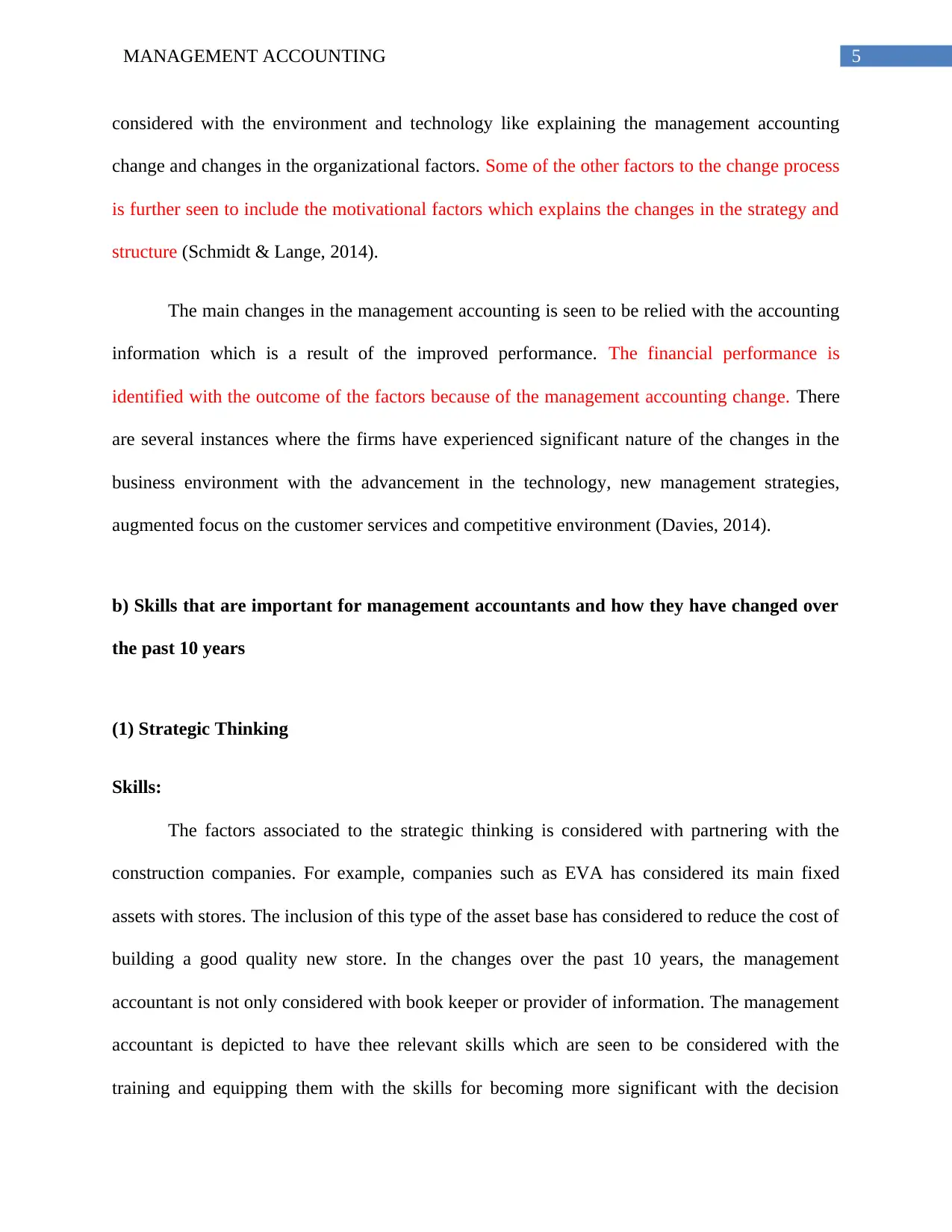
5MANAGEMENT ACCOUNTING
considered with the environment and technology like explaining the management accounting
change and changes in the organizational factors. Some of the other factors to the change process
is further seen to include the motivational factors which explains the changes in the strategy and
structure (Schmidt & Lange, 2014).
The main changes in the management accounting is seen to be relied with the accounting
information which is a result of the improved performance. The financial performance is
identified with the outcome of the factors because of the management accounting change. There
are several instances where the firms have experienced significant nature of the changes in the
business environment with the advancement in the technology, new management strategies,
augmented focus on the customer services and competitive environment (Davies, 2014).
b) Skills that are important for management accountants and how they have changed over
the past 10 years
(1) Strategic Thinking
Skills:
The factors associated to the strategic thinking is considered with partnering with the
construction companies. For example, companies such as EVA has considered its main fixed
assets with stores. The inclusion of this type of the asset base has considered to reduce the cost of
building a good quality new store. In the changes over the past 10 years, the management
accountant is not only considered with book keeper or provider of information. The management
accountant is depicted to have thee relevant skills which are seen to be considered with the
training and equipping them with the skills for becoming more significant with the decision
considered with the environment and technology like explaining the management accounting
change and changes in the organizational factors. Some of the other factors to the change process
is further seen to include the motivational factors which explains the changes in the strategy and
structure (Schmidt & Lange, 2014).
The main changes in the management accounting is seen to be relied with the accounting
information which is a result of the improved performance. The financial performance is
identified with the outcome of the factors because of the management accounting change. There
are several instances where the firms have experienced significant nature of the changes in the
business environment with the advancement in the technology, new management strategies,
augmented focus on the customer services and competitive environment (Davies, 2014).
b) Skills that are important for management accountants and how they have changed over
the past 10 years
(1) Strategic Thinking
Skills:
The factors associated to the strategic thinking is considered with partnering with the
construction companies. For example, companies such as EVA has considered its main fixed
assets with stores. The inclusion of this type of the asset base has considered to reduce the cost of
building a good quality new store. In the changes over the past 10 years, the management
accountant is not only considered with book keeper or provider of information. The management
accountant is depicted to have thee relevant skills which are seen to be considered with the
training and equipping them with the skills for becoming more significant with the decision
⊘ This is a preview!⊘
Do you want full access?
Subscribe today to unlock all pages.

Trusted by 1+ million students worldwide
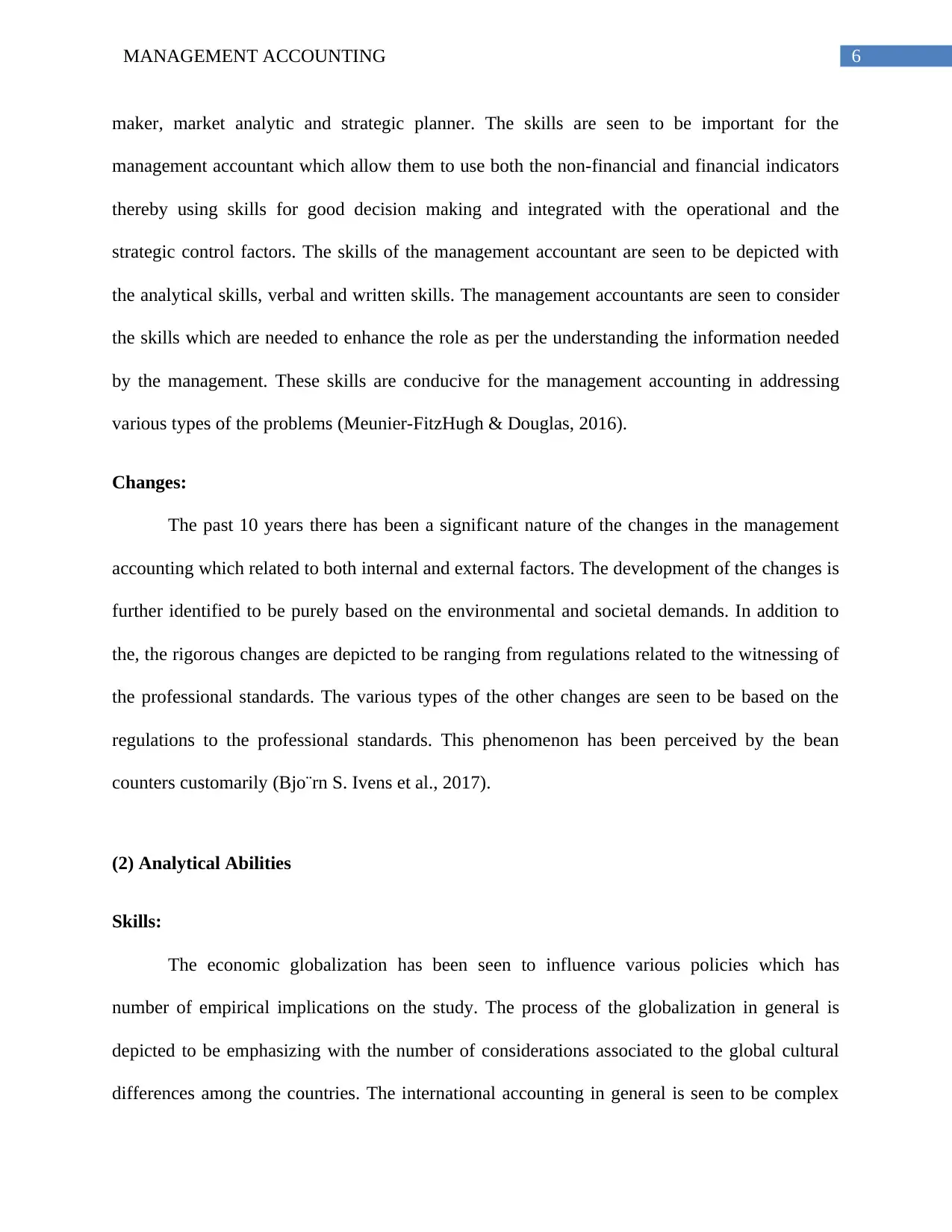
6MANAGEMENT ACCOUNTING
maker, market analytic and strategic planner. The skills are seen to be important for the
management accountant which allow them to use both the non-financial and financial indicators
thereby using skills for good decision making and integrated with the operational and the
strategic control factors. The skills of the management accountant are seen to be depicted with
the analytical skills, verbal and written skills. The management accountants are seen to consider
the skills which are needed to enhance the role as per the understanding the information needed
by the management. These skills are conducive for the management accounting in addressing
various types of the problems (Meunier-FitzHugh & Douglas, 2016).
Changes:
The past 10 years there has been a significant nature of the changes in the management
accounting which related to both internal and external factors. The development of the changes is
further identified to be purely based on the environmental and societal demands. In addition to
the, the rigorous changes are depicted to be ranging from regulations related to the witnessing of
the professional standards. The various types of the other changes are seen to be based on the
regulations to the professional standards. This phenomenon has been perceived by the bean
counters customarily (Bjo¨rn S. Ivens et al., 2017).
(2) Analytical Abilities
Skills:
The economic globalization has been seen to influence various policies which has
number of empirical implications on the study. The process of the globalization in general is
depicted to be emphasizing with the number of considerations associated to the global cultural
differences among the countries. The international accounting in general is seen to be complex
maker, market analytic and strategic planner. The skills are seen to be important for the
management accountant which allow them to use both the non-financial and financial indicators
thereby using skills for good decision making and integrated with the operational and the
strategic control factors. The skills of the management accountant are seen to be depicted with
the analytical skills, verbal and written skills. The management accountants are seen to consider
the skills which are needed to enhance the role as per the understanding the information needed
by the management. These skills are conducive for the management accounting in addressing
various types of the problems (Meunier-FitzHugh & Douglas, 2016).
Changes:
The past 10 years there has been a significant nature of the changes in the management
accounting which related to both internal and external factors. The development of the changes is
further identified to be purely based on the environmental and societal demands. In addition to
the, the rigorous changes are depicted to be ranging from regulations related to the witnessing of
the professional standards. The various types of the other changes are seen to be based on the
regulations to the professional standards. This phenomenon has been perceived by the bean
counters customarily (Bjo¨rn S. Ivens et al., 2017).
(2) Analytical Abilities
Skills:
The economic globalization has been seen to influence various policies which has
number of empirical implications on the study. The process of the globalization in general is
depicted to be emphasizing with the number of considerations associated to the global cultural
differences among the countries. The international accounting in general is seen to be complex
Paraphrase This Document
Need a fresh take? Get an instant paraphrase of this document with our AI Paraphraser
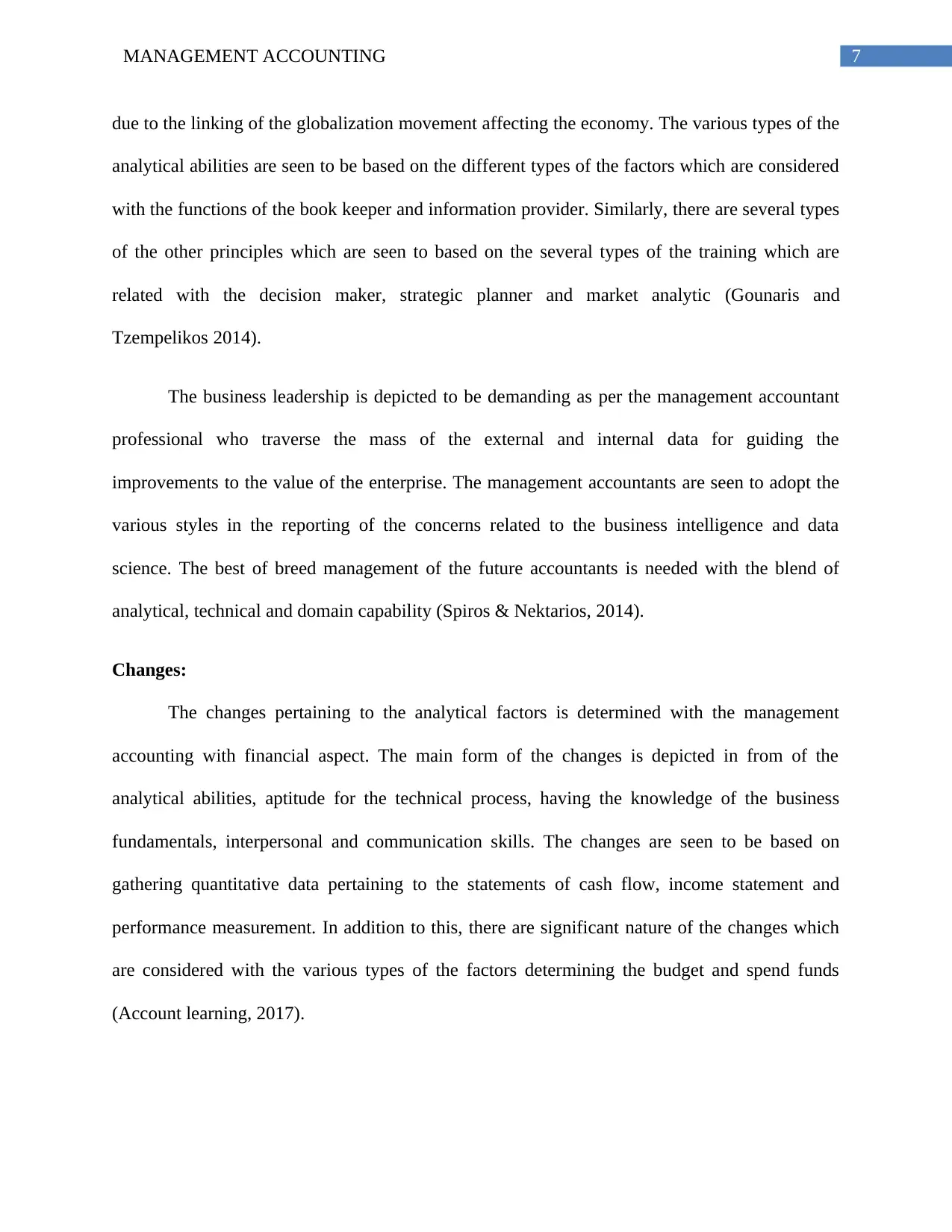
7MANAGEMENT ACCOUNTING
due to the linking of the globalization movement affecting the economy. The various types of the
analytical abilities are seen to be based on the different types of the factors which are considered
with the functions of the book keeper and information provider. Similarly, there are several types
of the other principles which are seen to based on the several types of the training which are
related with the decision maker, strategic planner and market analytic (Gounaris and
Tzempelikos 2014).
The business leadership is depicted to be demanding as per the management accountant
professional who traverse the mass of the external and internal data for guiding the
improvements to the value of the enterprise. The management accountants are seen to adopt the
various styles in the reporting of the concerns related to the business intelligence and data
science. The best of breed management of the future accountants is needed with the blend of
analytical, technical and domain capability (Spiros & Nektarios, 2014).
Changes:
The changes pertaining to the analytical factors is determined with the management
accounting with financial aspect. The main form of the changes is depicted in from of the
analytical abilities, aptitude for the technical process, having the knowledge of the business
fundamentals, interpersonal and communication skills. The changes are seen to be based on
gathering quantitative data pertaining to the statements of cash flow, income statement and
performance measurement. In addition to this, there are significant nature of the changes which
are considered with the various types of the factors determining the budget and spend funds
(Account learning, 2017).
due to the linking of the globalization movement affecting the economy. The various types of the
analytical abilities are seen to be based on the different types of the factors which are considered
with the functions of the book keeper and information provider. Similarly, there are several types
of the other principles which are seen to based on the several types of the training which are
related with the decision maker, strategic planner and market analytic (Gounaris and
Tzempelikos 2014).
The business leadership is depicted to be demanding as per the management accountant
professional who traverse the mass of the external and internal data for guiding the
improvements to the value of the enterprise. The management accountants are seen to adopt the
various styles in the reporting of the concerns related to the business intelligence and data
science. The best of breed management of the future accountants is needed with the blend of
analytical, technical and domain capability (Spiros & Nektarios, 2014).
Changes:
The changes pertaining to the analytical factors is determined with the management
accounting with financial aspect. The main form of the changes is depicted in from of the
analytical abilities, aptitude for the technical process, having the knowledge of the business
fundamentals, interpersonal and communication skills. The changes are seen to be based on
gathering quantitative data pertaining to the statements of cash flow, income statement and
performance measurement. In addition to this, there are significant nature of the changes which
are considered with the various types of the factors determining the budget and spend funds
(Account learning, 2017).
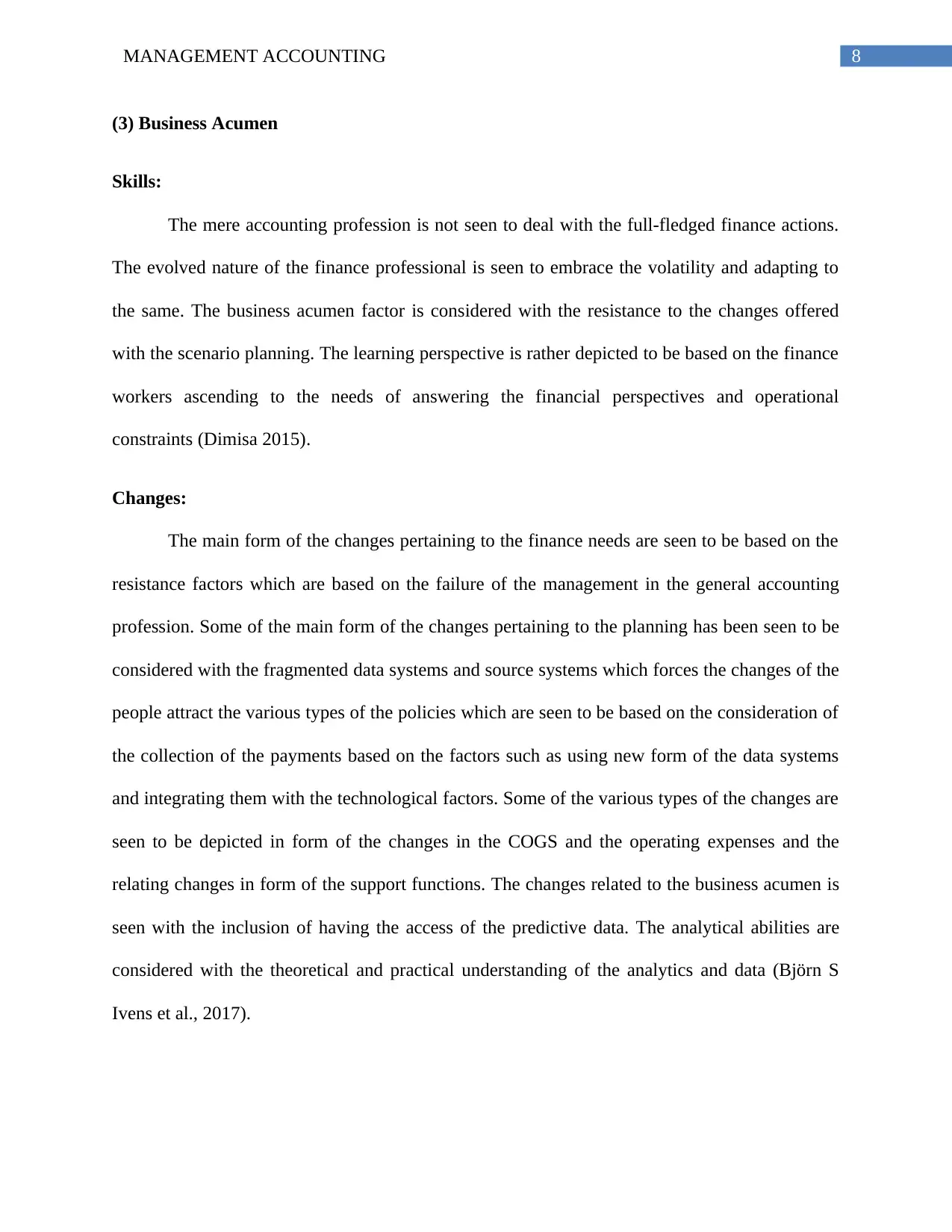
8MANAGEMENT ACCOUNTING
(3) Business Acumen
Skills:
The mere accounting profession is not seen to deal with the full-fledged finance actions.
The evolved nature of the finance professional is seen to embrace the volatility and adapting to
the same. The business acumen factor is considered with the resistance to the changes offered
with the scenario planning. The learning perspective is rather depicted to be based on the finance
workers ascending to the needs of answering the financial perspectives and operational
constraints (Dimisa 2015).
Changes:
The main form of the changes pertaining to the finance needs are seen to be based on the
resistance factors which are based on the failure of the management in the general accounting
profession. Some of the main form of the changes pertaining to the planning has been seen to be
considered with the fragmented data systems and source systems which forces the changes of the
people attract the various types of the policies which are seen to be based on the consideration of
the collection of the payments based on the factors such as using new form of the data systems
and integrating them with the technological factors. Some of the various types of the changes are
seen to be depicted in form of the changes in the COGS and the operating expenses and the
relating changes in form of the support functions. The changes related to the business acumen is
seen with the inclusion of having the access of the predictive data. The analytical abilities are
considered with the theoretical and practical understanding of the analytics and data (Björn S
Ivens et al., 2017).
(3) Business Acumen
Skills:
The mere accounting profession is not seen to deal with the full-fledged finance actions.
The evolved nature of the finance professional is seen to embrace the volatility and adapting to
the same. The business acumen factor is considered with the resistance to the changes offered
with the scenario planning. The learning perspective is rather depicted to be based on the finance
workers ascending to the needs of answering the financial perspectives and operational
constraints (Dimisa 2015).
Changes:
The main form of the changes pertaining to the finance needs are seen to be based on the
resistance factors which are based on the failure of the management in the general accounting
profession. Some of the main form of the changes pertaining to the planning has been seen to be
considered with the fragmented data systems and source systems which forces the changes of the
people attract the various types of the policies which are seen to be based on the consideration of
the collection of the payments based on the factors such as using new form of the data systems
and integrating them with the technological factors. Some of the various types of the changes are
seen to be depicted in form of the changes in the COGS and the operating expenses and the
relating changes in form of the support functions. The changes related to the business acumen is
seen with the inclusion of having the access of the predictive data. The analytical abilities are
considered with the theoretical and practical understanding of the analytics and data (Björn S
Ivens et al., 2017).
⊘ This is a preview!⊘
Do you want full access?
Subscribe today to unlock all pages.

Trusted by 1+ million students worldwide
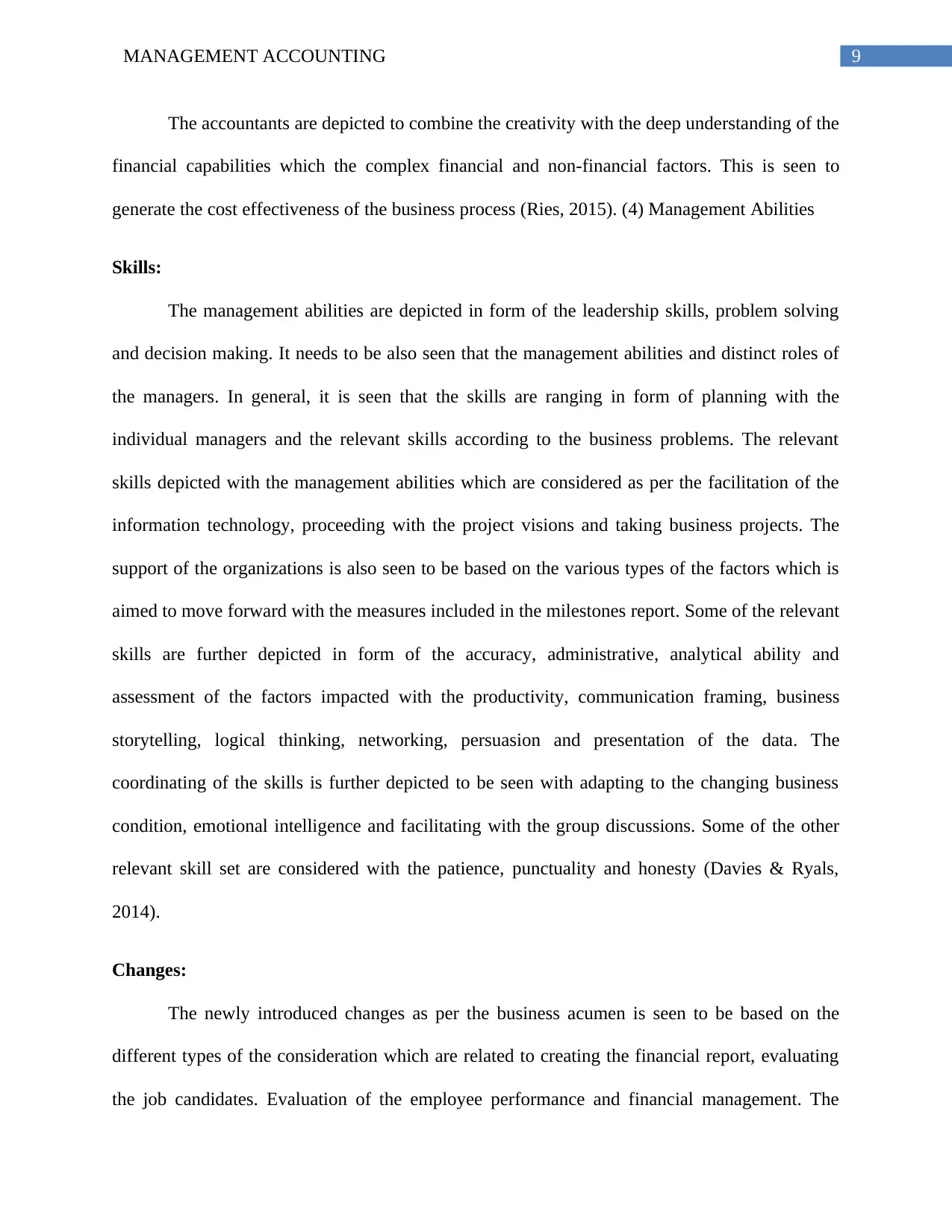
9MANAGEMENT ACCOUNTING
The accountants are depicted to combine the creativity with the deep understanding of the
financial capabilities which the complex financial and non-financial factors. This is seen to
generate the cost effectiveness of the business process (Ries, 2015). (4) Management Abilities
Skills:
The management abilities are depicted in form of the leadership skills, problem solving
and decision making. It needs to be also seen that the management abilities and distinct roles of
the managers. In general, it is seen that the skills are ranging in form of planning with the
individual managers and the relevant skills according to the business problems. The relevant
skills depicted with the management abilities which are considered as per the facilitation of the
information technology, proceeding with the project visions and taking business projects. The
support of the organizations is also seen to be based on the various types of the factors which is
aimed to move forward with the measures included in the milestones report. Some of the relevant
skills are further depicted in form of the accuracy, administrative, analytical ability and
assessment of the factors impacted with the productivity, communication framing, business
storytelling, logical thinking, networking, persuasion and presentation of the data. The
coordinating of the skills is further depicted to be seen with adapting to the changing business
condition, emotional intelligence and facilitating with the group discussions. Some of the other
relevant skill set are considered with the patience, punctuality and honesty (Davies & Ryals,
2014).
Changes:
The newly introduced changes as per the business acumen is seen to be based on the
different types of the consideration which are related to creating the financial report, evaluating
the job candidates. Evaluation of the employee performance and financial management. The
The accountants are depicted to combine the creativity with the deep understanding of the
financial capabilities which the complex financial and non-financial factors. This is seen to
generate the cost effectiveness of the business process (Ries, 2015). (4) Management Abilities
Skills:
The management abilities are depicted in form of the leadership skills, problem solving
and decision making. It needs to be also seen that the management abilities and distinct roles of
the managers. In general, it is seen that the skills are ranging in form of planning with the
individual managers and the relevant skills according to the business problems. The relevant
skills depicted with the management abilities which are considered as per the facilitation of the
information technology, proceeding with the project visions and taking business projects. The
support of the organizations is also seen to be based on the various types of the factors which is
aimed to move forward with the measures included in the milestones report. Some of the relevant
skills are further depicted in form of the accuracy, administrative, analytical ability and
assessment of the factors impacted with the productivity, communication framing, business
storytelling, logical thinking, networking, persuasion and presentation of the data. The
coordinating of the skills is further depicted to be seen with adapting to the changing business
condition, emotional intelligence and facilitating with the group discussions. Some of the other
relevant skill set are considered with the patience, punctuality and honesty (Davies & Ryals,
2014).
Changes:
The newly introduced changes as per the business acumen is seen to be based on the
different types of the consideration which are related to creating the financial report, evaluating
the job candidates. Evaluation of the employee performance and financial management. The
Paraphrase This Document
Need a fresh take? Get an instant paraphrase of this document with our AI Paraphraser
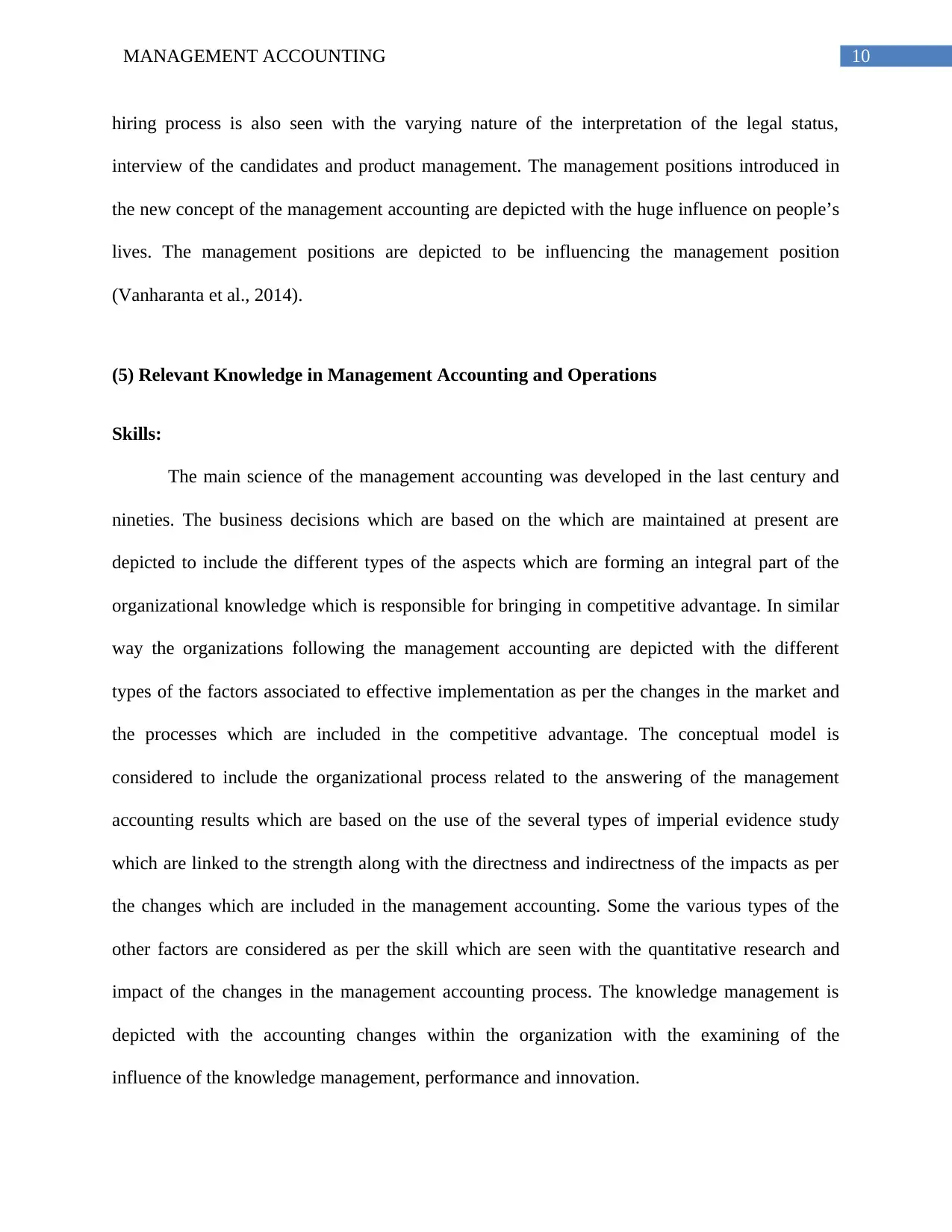
10MANAGEMENT ACCOUNTING
hiring process is also seen with the varying nature of the interpretation of the legal status,
interview of the candidates and product management. The management positions introduced in
the new concept of the management accounting are depicted with the huge influence on people’s
lives. The management positions are depicted to be influencing the management position
(Vanharanta et al., 2014).
(5) Relevant Knowledge in Management Accounting and Operations
Skills:
The main science of the management accounting was developed in the last century and
nineties. The business decisions which are based on the which are maintained at present are
depicted to include the different types of the aspects which are forming an integral part of the
organizational knowledge which is responsible for bringing in competitive advantage. In similar
way the organizations following the management accounting are depicted with the different
types of the factors associated to effective implementation as per the changes in the market and
the processes which are included in the competitive advantage. The conceptual model is
considered to include the organizational process related to the answering of the management
accounting results which are based on the use of the several types of imperial evidence study
which are linked to the strength along with the directness and indirectness of the impacts as per
the changes which are included in the management accounting. Some the various types of the
other factors are considered as per the skill which are seen with the quantitative research and
impact of the changes in the management accounting process. The knowledge management is
depicted with the accounting changes within the organization with the examining of the
influence of the knowledge management, performance and innovation.
hiring process is also seen with the varying nature of the interpretation of the legal status,
interview of the candidates and product management. The management positions introduced in
the new concept of the management accounting are depicted with the huge influence on people’s
lives. The management positions are depicted to be influencing the management position
(Vanharanta et al., 2014).
(5) Relevant Knowledge in Management Accounting and Operations
Skills:
The main science of the management accounting was developed in the last century and
nineties. The business decisions which are based on the which are maintained at present are
depicted to include the different types of the aspects which are forming an integral part of the
organizational knowledge which is responsible for bringing in competitive advantage. In similar
way the organizations following the management accounting are depicted with the different
types of the factors associated to effective implementation as per the changes in the market and
the processes which are included in the competitive advantage. The conceptual model is
considered to include the organizational process related to the answering of the management
accounting results which are based on the use of the several types of imperial evidence study
which are linked to the strength along with the directness and indirectness of the impacts as per
the changes which are included in the management accounting. Some the various types of the
other factors are considered as per the skill which are seen with the quantitative research and
impact of the changes in the management accounting process. The knowledge management is
depicted with the accounting changes within the organization with the examining of the
influence of the knowledge management, performance and innovation.
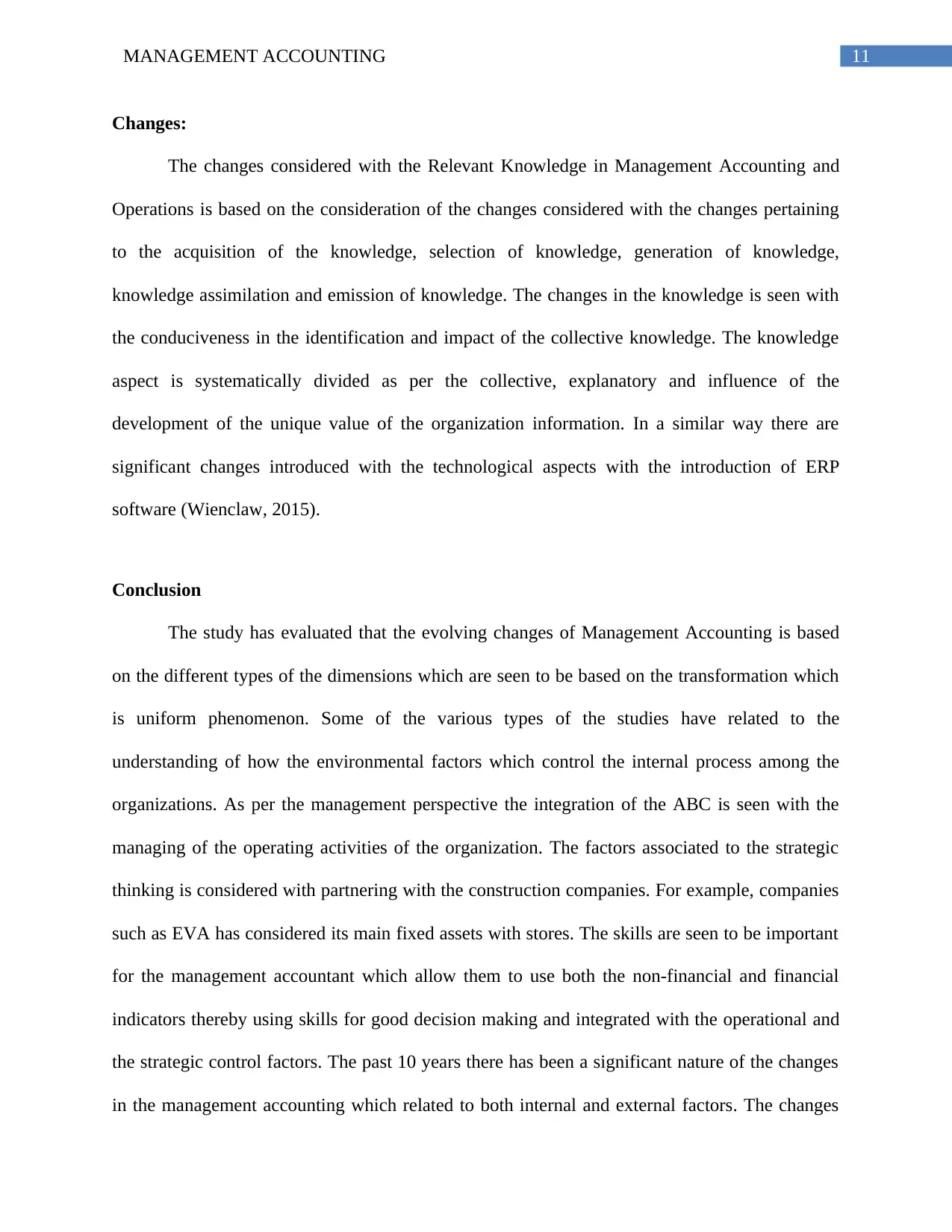
11MANAGEMENT ACCOUNTING
Changes:
The changes considered with the Relevant Knowledge in Management Accounting and
Operations is based on the consideration of the changes considered with the changes pertaining
to the acquisition of the knowledge, selection of knowledge, generation of knowledge,
knowledge assimilation and emission of knowledge. The changes in the knowledge is seen with
the conduciveness in the identification and impact of the collective knowledge. The knowledge
aspect is systematically divided as per the collective, explanatory and influence of the
development of the unique value of the organization information. In a similar way there are
significant changes introduced with the technological aspects with the introduction of ERP
software (Wienclaw, 2015).
Conclusion
The study has evaluated that the evolving changes of Management Accounting is based
on the different types of the dimensions which are seen to be based on the transformation which
is uniform phenomenon. Some of the various types of the studies have related to the
understanding of how the environmental factors which control the internal process among the
organizations. As per the management perspective the integration of the ABC is seen with the
managing of the operating activities of the organization. The factors associated to the strategic
thinking is considered with partnering with the construction companies. For example, companies
such as EVA has considered its main fixed assets with stores. The skills are seen to be important
for the management accountant which allow them to use both the non-financial and financial
indicators thereby using skills for good decision making and integrated with the operational and
the strategic control factors. The past 10 years there has been a significant nature of the changes
in the management accounting which related to both internal and external factors. The changes
Changes:
The changes considered with the Relevant Knowledge in Management Accounting and
Operations is based on the consideration of the changes considered with the changes pertaining
to the acquisition of the knowledge, selection of knowledge, generation of knowledge,
knowledge assimilation and emission of knowledge. The changes in the knowledge is seen with
the conduciveness in the identification and impact of the collective knowledge. The knowledge
aspect is systematically divided as per the collective, explanatory and influence of the
development of the unique value of the organization information. In a similar way there are
significant changes introduced with the technological aspects with the introduction of ERP
software (Wienclaw, 2015).
Conclusion
The study has evaluated that the evolving changes of Management Accounting is based
on the different types of the dimensions which are seen to be based on the transformation which
is uniform phenomenon. Some of the various types of the studies have related to the
understanding of how the environmental factors which control the internal process among the
organizations. As per the management perspective the integration of the ABC is seen with the
managing of the operating activities of the organization. The factors associated to the strategic
thinking is considered with partnering with the construction companies. For example, companies
such as EVA has considered its main fixed assets with stores. The skills are seen to be important
for the management accountant which allow them to use both the non-financial and financial
indicators thereby using skills for good decision making and integrated with the operational and
the strategic control factors. The past 10 years there has been a significant nature of the changes
in the management accounting which related to both internal and external factors. The changes
⊘ This is a preview!⊘
Do you want full access?
Subscribe today to unlock all pages.

Trusted by 1+ million students worldwide
1 out of 16
Related Documents
Your All-in-One AI-Powered Toolkit for Academic Success.
+13062052269
info@desklib.com
Available 24*7 on WhatsApp / Email
![[object Object]](/_next/static/media/star-bottom.7253800d.svg)
Unlock your academic potential
Copyright © 2020–2025 A2Z Services. All Rights Reserved. Developed and managed by ZUCOL.




